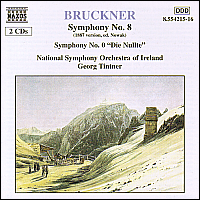


In 1863, when Bruckner was already thirty-nine years old, his composition teacher, Otto Kitzler gave him three final tests to finish his study: One choral work, one overture, and one symphony. Bruckner finished the symphony only in three months. That was the Symphony in F minor, also known as his Study Symphony. As a student work, the Symphony No. 00 sounds more like a piece of Mendelssohn or Schumann. The first performance of this work was on March 18, 1924, conducted by Franz Moissl.
Bruckner already began working on his Symphony in D minor in 1864/65, but he didn't finish it until 1869. Therefore, this symphony should originally be Brucknerís No. 2. It reflects Bruckner's development as a composer who came about through the influences of the music of Wagner and the so-called "Young German Movement." As a transitional work, Bruckner himself later declared the Nullte to be invalid. When Bruckner handed the score to Otto Dessoff (the conductor of Vienna Philharmonic Orchestra at that time) to expect a first performance. The conductor asked, "Where is the main theme?" This question might be the reason that Bruckner withdrew the symphony. It was first played on October 12, 1924 in Klosterneuburg, also conducted by Franz Moissl.

 Georg Tintner
Georg Tintner


There are very few recordings of the Study Symphony. Georg Tintner includes this work in his complete Bruckner symphonies cycle for Naxos. The playing of the Royal Scottish National Orchestra is persuasively warm and graceful, helped by the well-balanced recording. This account is wonderfully cohesive and fresh. There is also a performance of the Volksfest (Festival of the People) Finale of Symphony No. 4 on the CD.

 Georg Tintner
Georg Tintner


Tintnerís performance of the Die Nullte is coupled with his original version of the Eighth Symphony. Although people have more interests about the Eighth. The reading of the Symphony No. 0 is excellent, too. Here, Tintner tries to interpret the Brucknerís early work in a manner of Schubert, and the Irish orchestra play it with the same flair and dedication which are displayed in the Eighth.

Other Recommendations:
Symphony No. 00:

